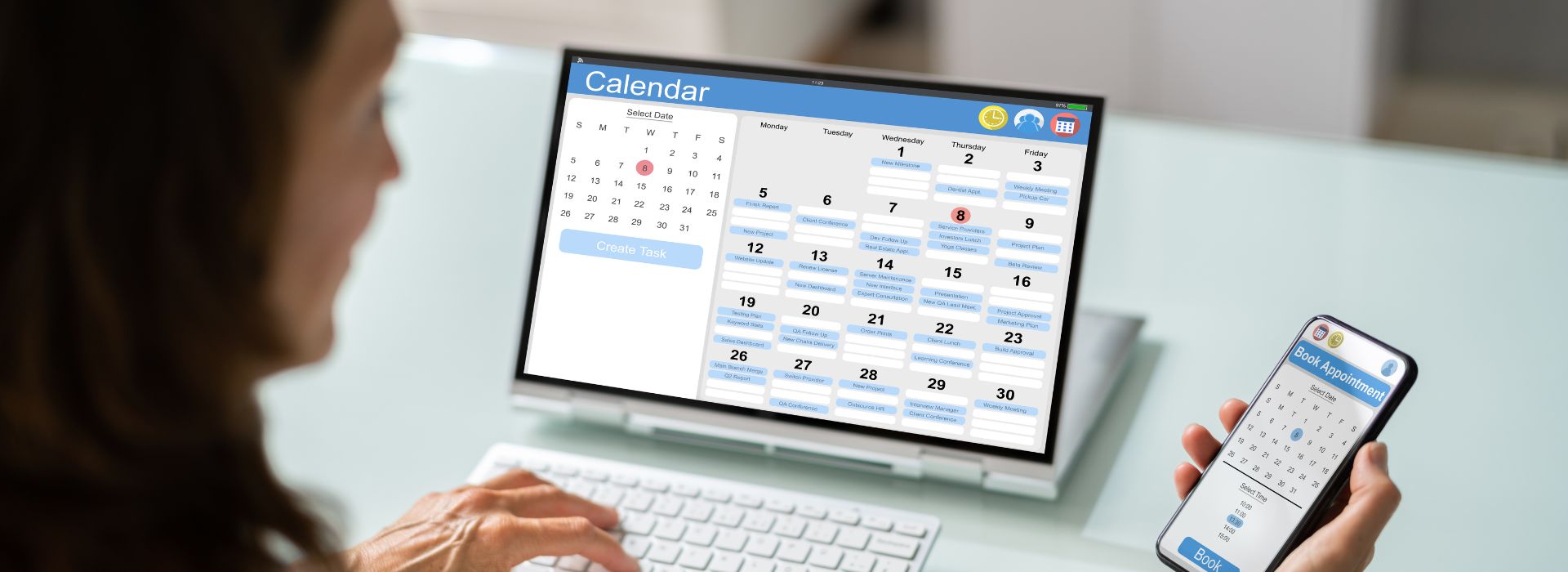Estimated reading time: 7 minutes
Peak seasons generally bring a flood of appointment requests, causing tremendous problems for the business. The common challenges related to these are:
- increased call volume,
- extended wait times,
- overbooking, and
- resource constraints.
Effective appointment management can efficiently manage all these challenges. Optimising your business’s scheduling processes will ensure timely appointments, reduce customer wait times, and maintain efficient business operations. Consequently, customer satisfaction and loyalty touch new heights.

Understanding Peak Seasons
But what are peak seasons in business terms? These are periods of heightened demand for your business or its services. Identifying your industry’s peak seasons and their impact on appointment scheduling ensures your business can deliver consistently and effectively.
Identifying Peak Seasons in Your Industry
Demand in various industries peaks at different times. For example, if you are in the retail industry, you will experience peak demand during the holiday season, particularly Christmas and Black Friday. On the other hand, the peak demand for tax preparation/ filing services is in the months counting down to the tax filing deadline.
Similarly, schools and other educational settings are always peaking in terms of enrollment during back-to-school seasons, just like healthcare providers experience surges in appointments with patients during the flu season.
Impact of Peak Seasons on Appointment Scheduling
Peak seasons often bring dramatic spikes in appointment demand, which can lead to overbooking and service delays. Of course, businesses end up with dissatisfied customers and even bad reviews on the internet. Retail sectors report surges during holidays, and a medical practice might find a steep increase during flu season. These spikes sometimes flood the scheduling systems and require robust management strategies that keep the operations smooth.
Preparing for Peak Seasons
Preparing and mobilising resources in advance can help plan for the peak season. Forecasting appointment demands, scaling staffing levels to meet rising demands, optimising scheduling systems, and implementing effective communication strategies that manage customer expectations are ways to overcome it.
Analysing Historical Data
- Past appointment data helps in arriving at trends for the future and offers insights on how to manage companies’ resources in the peak seasons more adeptly.
- Businesses can find repeated trends of which days have the highest demand, times of the day when most bookings are made, and the highest demanded services by using historical booking trends data.
- Data analytic tools are a great aid in discovering hidden patterns and correlations within the data. For instance, by analysing previous peak season data, one might estimate the average increase in appointment volume, detect drivers of spikes in demand, or predict periods in the future that will experience high demand.
- Businesses could then make better decisions about staffing, inventory levels, or various marketing activities.
Staff Training and Allocation
- Staff training and flexible scheduling manage peak season demands miraculously. Adequately trained employees can execute their roles effortlessly in peak seasons.
- On the other hand, flexible scheduling will accommodate fluctuating demands on staff.
- Now, cross-training employees can be the magic wand in peak times. By training people from other departments, you can create a versatile talent pool of their employees.
- For example, a receptionist might be cross-trained to take appointments, and a sales associate might be taught how to process returns.
- Such cross-training supports efficiency and gives a positive vibe to the workspace, boosts employees’ confidence and guarantees satisfied employees.
Optimising Your Booking System
Optimising your booking system entails using user-friendly software to customise the different types of appointments. It will ensure that your customers experience smooth sailing during the booking process.
Automating Appointment Scheduling
Automated scheduling tools streamline the booking process, significantly reducing manual labour, minimising scheduling errors, and enhancing customer satisfaction.
Why don’t you visit Edulyte? It offers robust appointment scheduling automation features, allowing you to create multiple appointment types with varying durations and availability. You even get a video conferencing tool and a seamless payment system. Edulyte can undoubtedly handle increased appointment demand during peak seasons while maintaining operational efficiency.
Implementing Waitlists and Cancellations
- While going through the options for booking appointment tools, you may notice a waitlist feature.
- Don’t be perplexed! During peak season, the waitlist feature gives your clients the facility to wait for unavailable services. Hence, your business will not lose out on potential customers.
- When any prior appointment gets cancelled, the system automatically notifies the waitlisted customers of the availability.
- Policies on cancellation and rescheduling go a long way in ensuring customer satisfaction.
- Clearly outline cancellation policies, specifying sufficient timeframes that will provide the least possible last-minute cancellations. Be flexible when customers need to reschedule.
- Consider using an automated email or text reminder to minimise the occurrence of no-shows.

Enhancing Customer Communication
Go for customer communication with clear and timely updates, personalised interactions, and multiple channels of communication. Your business gets to build trust and manage expectations, reducing customer frustration during peak seasons.
Proactive Communication Strategies
- Keeping customers informed about the availability of appointments and probable delays will manage expectations and build trust.
- Notifying customers earlier can diffuse some of their frustration, thereby making a cancellation or no-show unlikely.
- Email and text reminders can significantly reduce no-shows. Custom reminders can be set up before the actual appointment to send personalised details on the appointment, location, and contact.
- Do not forget appointment confirmation options, such as a text or email. In this manner, you can improve attendance and optimise resource allocation.
Offering Self-Service Options
- Offering customers online booking, rescheduling, and cancelling appointment options dramatically reduces call volumes to customer care and frees up staff to deal with more complex enquiries.
- While it improves efficiency, it also improves customer satisfaction through the convenience and control provided.
- Acuity Scheduling, Calendly, and Square Appointments provide user-friendly platforms to make appointment management a simple process.
- They integrate seamlessly with various calendars while providing more customisation for appointments, durations, and availability.
- With self-service options, customers are capable of making appointments, helping fast-track the operations of a business and reducing time spent waiting in line.
Managing Resources Effectively
Managing resources effectively relates to optimising staffing levels, scheduling efficiency, and the use of technology. In return, you get proper allocation of personnel and equipment, boosting productivity and customer satisfaction.
Utilising Resource Management Tools
- Resource management tools are beneficial in fully utilising staff and resources, particularly during peak seasons. The tool provides real-time employee schedule visibility, skill sets, and workload, helping any business to make informed decisions related to its staffing.
- By analysing historical data and forecasting demand, resource management tools help balance workloads, prevent overbooking, and ensure optimal utilisation of resources.
- An incorporated resource management tool with a booking system provides strong technical synergy to both parties.
- This kind of integration synchronises the availability of staff without overlapping with appointment slots, hence allowing efficient scheduling.
- It will also provide valuable insights into resource utilisation patterns to point out potential gaps in various staffing level needs and optimise scheduling practices.
Flexible Scheduling Policies
- Flexible scheduling policies allow organisations to react to demand variations, especially during peak seasons.
- They can do this by extending hours, appointment blocks, or staggered shifts to accommodate customer preference and optimise resource utilisation.
- To run this flexible scheduling feature successfully, clearly define your policy regarding eligible appointment types, available time slots, and any restrictions.
- Develop and communicate transparent policies for customers through your website, booking system, and customer service channels.
- Provide incentives for priority booking to motivate customers towards flexible appointment times.
Conclusion
- Understanding and Preparing for Peak Seasons: Businesses must identify peak seasons, analyse historical data to predict demand and allocate resources accordingly to ensure smooth operations and customer satisfaction.
- Leveraging Technology and Customer Focus: Implementing appointment scheduling software, automated tools, and self-service options can significantly improve efficiency and customer experience during peak periods. Strong communication and flexible scheduling policies are essential.
- Resource Optimisation and Training: Effective resource management through tools and flexible scheduling is crucial. Cross-training employees and providing clear communication can enhance overall performance and customer satisfaction during peak times.
Similar Blogs
Learning lessons, study tips, career guides and much more!
How to Integrate Google Calendar with Edulyte
Estimated reading time: 4 minutes Stay Organised and Never Miss an Event While Edulyte offers an intuitive built-in calendar to manage…
How to Implement an Online Booking System for Service-Based Businesses
Estimated reading time: 9 minutes Online appointment booking systems are certainly necessary tools for modern service-driven businesses. They provide customers…
How to Set Up an Appointment Booking System for Your
Estimated reading time: 6 minutes Why is your business losing out on tremendous growth without an appointment system for business?…
Effective Calendar Booking Strategies for Busy Professionals
Estimated reading time: 12 minutes In a highly competitive professional world, staying organised keeps you ahead in the race and…
Ultimate Guide to Online Booking Websites
Estimated reading time: 5 minutes Manual scheduling and wireless phone calls no longer hold in today’s fast-paced world. What you…
Google Calendar: Essential Tips for Efficient Time Management
Estimated reading time: 15 minutes Want to unlock the secrets to effective time management and better organisation? Edulyte introduces you…







